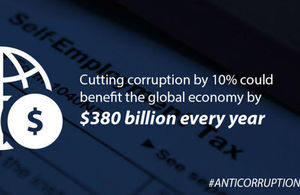Op-ed by the British High Commissioner to Tanzania on Anti-Corruption Day
“It is a time to pause and reflect on the scourge of corruption”. Reflections from British High Commissioner Sarah Cooke on International Anti-Corruption Day.

Anti-Corruption
Today is not only the occasion of Tanzania’s Independence Day, it is also International Anti-Corruption Day. It is a time to pause and reflect on the scourge of corruption, and on a momentous year for those who fight it. The case against corruption has been made many times, whether in terms of the $500m per year lost to Tanzania in illicit financial flows; or of the mother in Geita who had to pay 25,000/- before a nurse would deliver her baby; or of the 110,000 elephants lost to the planet since 2006.
But simply making the case isn’t enough, governments and people must take action. Whether it’s eliminating ghost workers, tackling scandals head on, or taking even the most senior officials to Court to face trial, President Magufuli’s government is taking the kind of action needed. Changes to the law, the structure of the judiciary, and setting a new standard for integrity will all help to drive out corruption in Tanzania. This is not just the right thing to do; it’s also good for business. A level playing field ensures that the best quality investment comes to Tanzania to support industrialisation.
The UK is supporting Tanzania’s efforts, for example by providing training and resources to the judiciary, and building institutional partnerships between the Prevention and Combating of Corruption Bureau and UK law enforcement. We are seeing unprecedented cooperation between our countries to take cases forward and learn from them. Through the UK aid budget, we also help communities across the country to access basic services, and support them to mobilise when corruption threatens their safety, health and livelihoods.
This year, the UK hosted the first Anti-Corruption Summit in London. 41 countries made concrete commitments to expose corruption, punish the perpetrators and drive out the culture of corruption wherever it exists. The UK now has a beneficial ownership register of who really owns companies, and we make sure that stolen Tanzanian money that ends up in Britain is returned, in accordance with the rule of law.
And it’s not just the UK. Tanzania’s efforts are now aligned, better than ever before, with the collective will of other nations. In September 2015 the UN General Assembly agreed to substantially reduce corruption and bribery in all their forms as part of the Sustainable Development Goals. More than words, this Goal symbolises a new momentum. New technical standards across Africa on tax transparency, open contracting and law enforcement cooperation are closing down space for the corrupt.
But too often, around the world, anti-corruption campaigns have stalled against a barrier of entrenched interests. Countries that have truly overcome corruption have done so by combining leadership and political will with the best expertise, following a clear strategy. A strategic approach means the best people in civil society are empowered to stand up for their own communities against those who would steal. It recognises that in the modern world open and transparent information about budgets, land use and government performance is the best way to safeguard integrity. And it lets every bit of government work together efficiently, guiding the decisions of every ministry, department and agency towards a sustainable long-term future.
A successful marriage between political will and strategic excellence can really help Tanzania’s anti-corruption drive succeed. In the UK, and in many other willing partners, Tanzania has friends to encourage and support it on this journey.